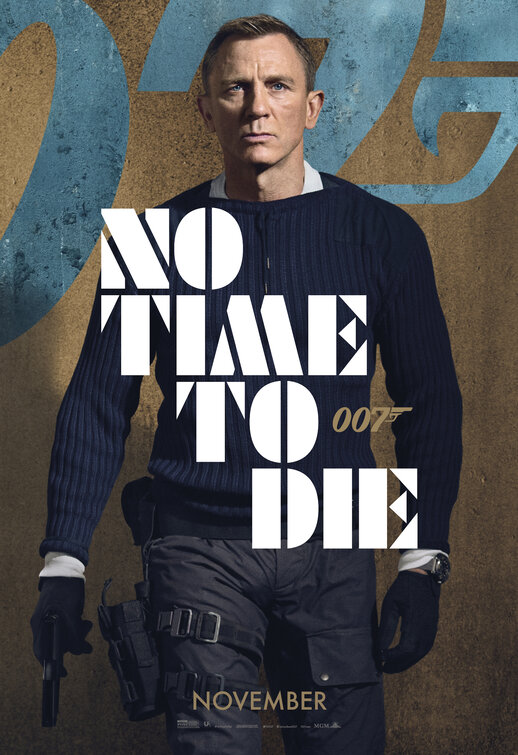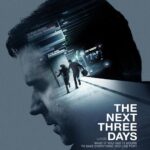This Changes Everything
Director
Cary Joji Fukunaga
Starring
Daniel Craig
Rami Malek
Léa Seydoux
In an unusual move, the film effectively starts with two cold opens. The first is a flashback to Madeleine Swann’s [Seydoux] childhood wherein we see her mother killed by a masked assailant – a victim of her villainous father. The film then jumps ahead to an effective honeymoon period between Bond [Craig] and Swann. Under Seydoux’s advisement, Bond visits the tomb of former lover Vesper Lynd, however upon arrival the pair are ambushed, destroying the MI6 agent’s trust for his partner. Five years later a highly sophisticated bioweapon is stolen and Bond is forced to return to MI6 to assist in its recovery.
The last five Bond films have been the most directly connected narrative in the franchise’s history and has proven extremely successful because of it. As such, there is a distinct air of legacy to the various elements on show. Not only do we have references and threads from the last four films, there are countless nods to 60+ years of James Bond. Most important, however, is that their execution is vastly superior to something like Die Another Day. From the subtle portraits of former “Ms” to the use of leitmotifs from decades of Bond films woven into the score, there’s a through-line of historical weight and representation. On top of that we are also treated to plenty of treachery and double-crossing one would expect from a spy thriller but plenty of 90s level action and comedy has made a welcome return to inject a bit of life and fun into the grounded grittiness we have come to expect from this particular iteration of Bond.
Speaking of the man himself, James Bond now has the most complete arc in his history. While we previously enjoyed standalone, almost serial-esque outings, these five features create a single (albeit choppy) story. With his emotional journey, the eponymous spy is given more nuance and is less of a misogynistic brute. He is constantly caught off guard, being unable to read an obvious double agent, allowing himself to be trapped and manipulated and thoroughly underestimating a young female CIA agent. For the fact that we don’t have this constant refresh from film to film, with Bond actually growing from a hot-headed middle aged man to a thoroughly tired and bitter older man will ensure not only Craig as one of the best portrayals of the character and a fan favourite but also likely dictate how the franchise will push forward.
I would also add that, as was attempted during the Brosnan years, the Craig Bond films try to combat the idea of “the Bond girl” by portraying driven women who challenge both the main character’s (and the audience’s) preconceptions of the world around him. While there have been varying/arguable levels of success with this, nowhere is it better illustrated than in this feature. Everything we have come to expect from Bond’s existence, his allies, his attitudes and actions, as well as the theatre he operates in, are given a little more scrutiny. Things cannot remain static for the series to progress and if the world is changing but the central figure refuses to, one could argue what is the relevance of such an individual. This, obviously, can strike a tone with the target demographic but will no doubt be called out by detractors as Bond being too liberal or conscientious while failing to understand that this is the growth the character so desperately needed.
Unfortunately, where the film doesn’t grow or progress is the villain. The idea of what Lyutsifer Safin [Malek] represents is infinitely more impressive than the actual confrontation and never truly lives up to the hype of complexity at the start. Safin’s plan is a little odd, there isn’t much effort to explain what he’s been doing from the cold open to his re-emergence, there is a strong focus on his otherness, as represented by his thick accent, effete manner and disfigurements. The script does its best to imply a shadow, that Safin is the other side of the coin for Bond, a cautionary tale of what he could have been but the truth is that was never the case and has been done better in former Bond films. It’s just disappointing that we are still focusing on the same tired representations of marginalised communities to portray villains. I will, however, give the film some credit in not calling him Dr No. So much of the movie from its title to the opening credits to the denouement’s setting give several clues that the villain is in fact Dr No in all but name and I actually appreciate the restraint; if that indeed was the intention.
No Time To Die is constructed extremely well and it’s always good to see the franchise with in-camera practical effects – which admittedly kind of makes the CGI-heavy finale feel a little out of place at times. In my review for Skyfall I mentioned that at that point, the story had been brought full-circle to a degree, with all the series tropes in place, one could seamlessly slot straight into Dr No. Little did I appreciate that we’ve come so far from the lampooning of comedies like Austin Powers that we can indeed have a story that ends on a volcano island base with a softly spoken megalomaniac, surrounded by people in 60s-style hazmat suits, threatening to end all life on earth with the weaponised terror of the moment. Where we had the cold war nuclear fear, now we have an impossibly unstoppable viral peril, it’s a marvellously 21st century threat that feels painfully prescient considering this film was originally scripted, shot and scheduled for release long before the covid pandemic.
The film is not without faults. After the splashy thrills of Cuba, it sits into itself and delivers a fairly mature thriller and while this will please some, it could be considered boring for others; although unlike Quantum Of Solace, which came out during the writer’s strike, everything flows well and the whole effort is surprisingly well paced for nearly 3 hours. But again, this is largely due to attempts to course correct from the previous film, being forced to to cram in a fuller conclusion to Bond’s nemesis and resolve the threat of Spectre while telling its own unique story and on top of that offering something entirely new: an end to the Bond saga.
As stated earlier, this is the first time in its history that we have a connected Bond story with a start, middle and end. But despite this connected plot, it doesn’t actually have the satisfaction of an overall story because each instalment was made without any real overarching plan and when watching all 5 back-to-back the cohesion is lost, realising that it’s mostly foggy memories that helped it along in the first place. It’s not so much the lack of a plan, more the stop-start energy that repeatedly resets the story. Every time you have a handle on who Bond is, the landscape of the country he serves and the mastermind adversary in front of him, we are treated to a jilted restructuring that impacts the momentum.
In spite of its minor failings, No Time To Die will serve as an extremely bold and satisfying conclusion to a beloved era that resurrected a hobbled franchise. Naturally there will be plenty of discussion about where the series will go next and who will take on the mantle but for now let’s just appreciate that MGM have accomplished something some would have never thought possible: an end for James Bond.
Release Date:
30 September 2021
The Scene To Look Out For:
In a film littered with spectacle and action beats among mounting suspense, there is naturally a wealth of content to highlight but for me, one of the standout moments was the raid on the MI6 lab in London. From the opening shot of insurgents scaling the skyscraper windows at dusk to the frenetic and terrifying ransacking of the laboratory, it felt less like a standard Bond action requirement and more like the tense thriller it projects itself as.
Notable Characters:
While I would like to focus on the pleasing supporting roles of individuals like Ben Whishaw, Lashana Lynch Ana de Armas or Ralph Fiennes, I have to focus on something altogether different. I can’t get past Swann and Bond as a couple. The script works valiantly to push these two together and portray them as ill-fated but destined lovers, that their circumstance and history mean they are fated to be together. But the truth is, I still don’t see the chemistry between Craig and Seydoux. Both play their roles with diligence and care respectively but when together I am in no way convinced of their compatibility or desire. It’s unfortunate because in essence the entire five film narrative hinges on Bond being hung up on Lynd but wanting to move on with Swann and while I am absolutely sold on the former, the latter just doesn’t work for me.
Highlighted Quote:
“If you have nothing to give you are irrelevant. We thank you for your service again. Goodbye”
In A Few Words:
“Surface imperfections and series correction aren’t enough to sully the veneer of this decently put together final outing for an iconic blockbuster staple”
Total Score: 4/5

![The Red Right Hand Movie Reviews [Matthew Stogdon]](https://reviews.theredrighthand.co.uk/wp-content/uploads/2021/12/cropped-header1.png)



